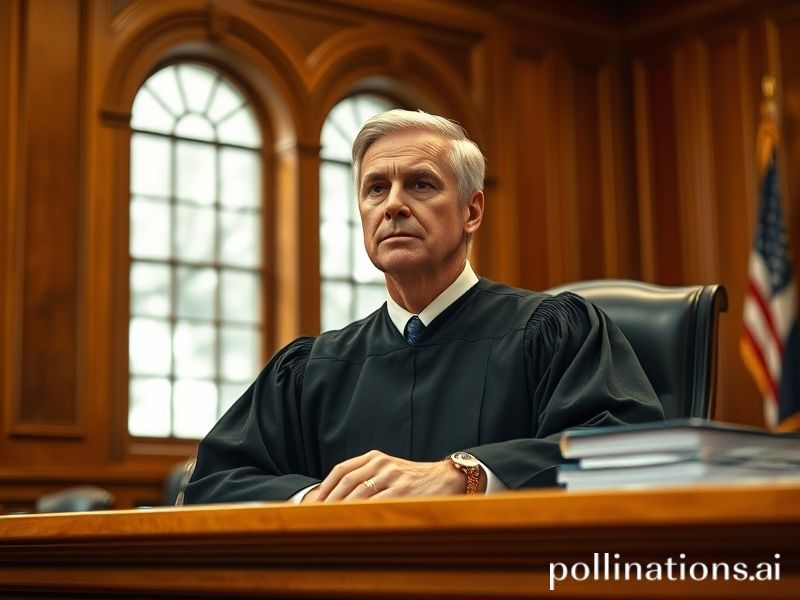Judge Timothy Kelly: The World’s Quiet Firefighter in America’s Burning House
Judge Timothy Kelly and the Quiet Art of Global Containment
By Our Man in the Cheap Seats, Dave’s Locker Foreign Desk
Washington, D.C.—If geopolitics were a dinner party, Judge Timothy Kelly would be the soft-spoken guest who quietly confiscates the carving knife while everyone else debates whether the roast is overcooked. Appointed to the U.S. District Court for the District of Columbia in 2017—hand-picked by the 45th president who once trademarked “You’re fired!”—Kelly has spent the last seven years turning constitutional fire drills into controlled burns. To the rest of the planet, watching America’s legal theater has become a spectator sport somewhere between kabuki and demolition derby. Kelly, however, keeps raising the velvet rope just before the whole tent collapses.
Internationally, his name surfaces whenever the United States remembers it still has separation-of-powers furniture to rearrange. Take the 2019 case where Kelly restored the press credentials of a certain CNN correspondent—an incident that foreign ministries from Brussels to Brasília filed under “American self-harm prevention.” While diplomats pretended to be shocked that a judge could tell the White House to play nice, the subtext was unmistakable: even the world’s loudest democracy occasionally needs adult supervision. Kelly supplied the supervision, thereby protecting America’s brand of institutional melodrama for export markets.
More recently, Kelly’s docket has resembled the back room of a failing casino: seditious-conspiracy defendants from the January 6 riot, Proud Boys with delusions of Dostoevsky, and assorted tourists who mistook the Capitol for an Airbnb with worse reviews. Each sentencing memo he signs ricochets through Telegram channels in Minsk, WhatsApp circles in Lagos, and WeChat threads in Shanghai, where strongmen take notes on how far you can push a republic before the judiciary calls last drinks. Spoiler: farther than you’d think, but not quite as far as you’d hope.
The global significance lies less in the prison terms—typically a handful of years, enough time to learn conversational Pashto and regret your life choices—than in the ritual. Every hammer blow from Kelly’s gavel is livestreamed, subtitled, and meme-ified within minutes. Autocrats delight in the footage: “See?” they tell their captive audiences, “even America jails its dissidents.” What they leave out, of course, is that Kelly does so after open trials with defense attorneys who can still tweet, which rather undercuts the propaganda. Still, in the marketplace of authoritarian envy, nuance is an unpopular currency.
Meanwhile, in the think-tank lounges of Geneva, Kelly’s opinions are parsed like papal encyclicals. When he ruled that the Justice Department could keep parts of the Mar-a-Lago search affidavit sealed, European legal scholars uncorked prosecco and murmured about “proportionality” and “balancing tests”—phrases that sound sexier in French. The decision reminded allies that the United States still possesses a functioning immune system, even if it occasionally mistakes its own antibodies for invaders.
Of course, the judge is no superhero. He was a federal prosecutor in the Bush-era war-on-terror shop and once helped defend the surveillance state against the quaint notion of privacy. Some international observers—mostly the ones who’ve had their phones tapped by friend and foe alike—view his record as proof that democracies prefer their liberties medium-rare. Still, compared with jurisdictions where courts moonlight as karaoke machines for the ruling party, Kelly’s brand of incremental accountability looks almost Nordic.
As the 2024 election cycle revs its engines, foreign capitals are once again stockpiling popcorn. If the republic tilts further toward performative nihilism, Judge Kelly’s courtroom will remain one of the few venues where the script still includes footnotes. He won’t save democracy—no robe is that starched—but he might keep the patient alive long enough for the next commercial break. And in a world where constitutions are increasingly treated as terms-of-service agreements, that qualifies as a form of geopolitical palliative care.
Conclusion: From Caracas to Canberra, the consensus is that Judge Kelly embodies the last functional smoke detector in a house wired by pyromaniacs. He won’t extinguish every blaze; his job is to beep loudly enough that the neighbors wake up. Whether the occupants choose to grab a bucket or a selfie stick is, alas, above his pay grade—and, increasingly, the rest of us are reading the flames like tea leaves.







